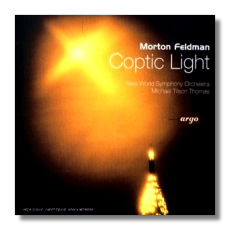
The Internet's Premier Classical Music Source
Related Links
- Feldman Reviews
- Latest Reviews
- More Reviews
-
By Composer
-
Collections
DVD & Blu-ray
Books
Concert Reviews
Articles/Interviews
Software
Audio
Search Amazon
Recommended Links
Site News
 CD Review
CD Review
Morton Feldman

Coptic Light
- Coptic Light
- Piano and Orchestra
- Cello and Orchestra
Alan Feinberg, piano
Robert Cohen, cello
New World Symphony Orchestra/Michael Tilson Thomas
Argo 448513-2 DDD 73:35
The time has come for Morton Feldman's name to be better known, or at least to be breathed in the same sentence as John Cage's. This CD might make this possible.
Feldman was, to say the least, unusual. His stated goal, similar to Cage's, was to remove intention from composition; in effect, he wanted the sounds to compose themselves. Paradoxically, the more a composer wants this, the harder he has to work to get it. Feldman took great pains over his scores to keep them from sounding man-made. They lack traditional themes and development. Instead, they are rigorous explorations of timbre; no composer had an intuitive understanding of additive timbres quite like Feldman did. They also play havoc with our sense of time, both short-term and long-term. Phrases, if one can call them that, are carefully put together so as to avoid any sense of definite contour. Some of his late works take several hours to play. Even the shorter ones, like the three on this CD, seem entrancingly, hypnotically long because they seem to have no beginning, middle, or end - they are like cross-sections of clouds.
Coptic Light was premièred by the New York Philharmonic in 1985, just two years before Feldman's death. This 30-minute piece is a shimmering web of hushed sound. In a sense, it's an example of Maximalism - every instrument, like a bee in a hive, seems to be working on the same project, but no two instruments are doing it in exactly the same way. As one listens closely, patterns emerge, but they are elusive, and they alter as soon as one tries to hold on to them. The texture is dense, but nevertheless suffused with a gentle light. The title refers to Coptic textiles Feldman saw in the Louvre. Feldman was struck by how these fragments "conveyed an essential atmosphere of their civilization." a mysterious explanation, perhaps, but no less than one would expect of this mysterious composer.
Piano and Orchestra is just that. Feldman requests that this music be played "without the feeling of a beat." The marking is "extremely quiet." There are a few violent spasms, though; one near the end of the piece is absolutely shocking, given its context. Feldman's masterful scoring holds the listener's interest even though the music is utterly vertical and almost completely lacking in a horizontal impulse. Has a pianist ever had less of a bravura showpiece to play with an orchestra? The same goes double for Cello and Orchestra. This music exists on the other side of the fence that marks the boundaries of our consciousness. Its otherworldly beauty defies traditional expectations about what Western classical music should "do"; Feldman probably would have argued that music should not "do" anything. It does nothing very well in Cello and Orchestra, which is like a giant Calder mobile suspended in hardly any breeze at all.
Tilson Thomas was an acquaintance of Feldman's, and his conducting is very compelling. A recording of Coptic Light by conductor Michael Morgan and the Deutsches Symphonie-Orchestra Berlin (CPO 999189-2) seems gross in comparison. The New World Symphony Orchestra, a student orchestra based in Miami Beach, shows off its remarkable powers of concentration, and Feinberg and Cohen follow their quiet ecstasy. The engineering is top-notch.
Every classical CD collection needs some Feldman. If just one CD is all you want, then let it be this one.
Copyright © 1999, Raymond Tuttle


















